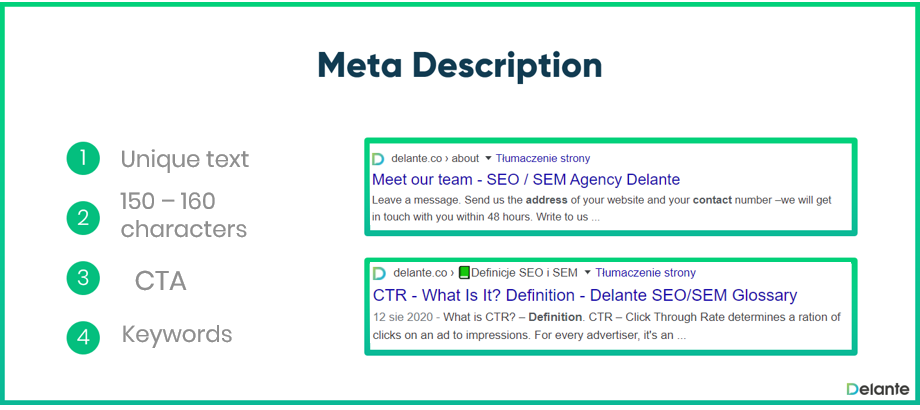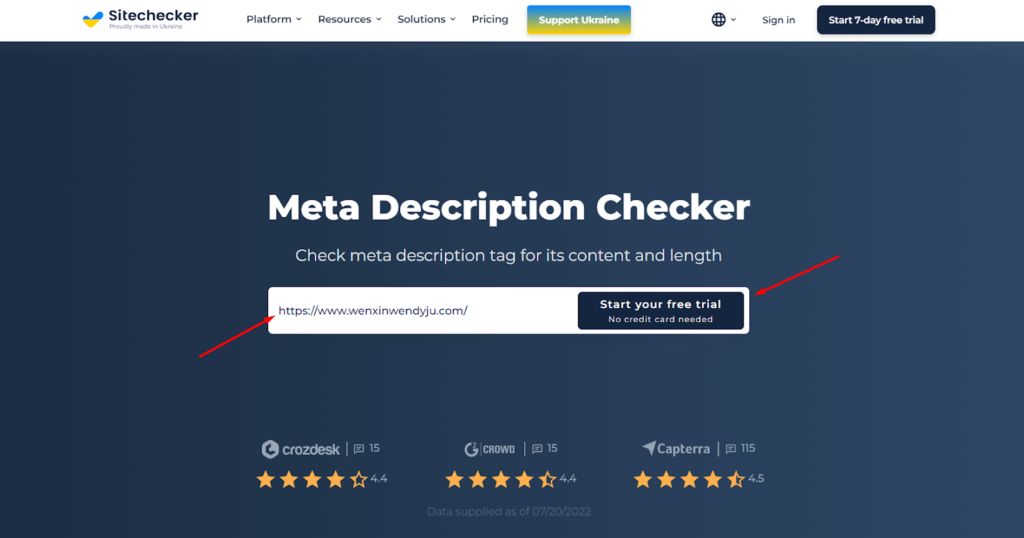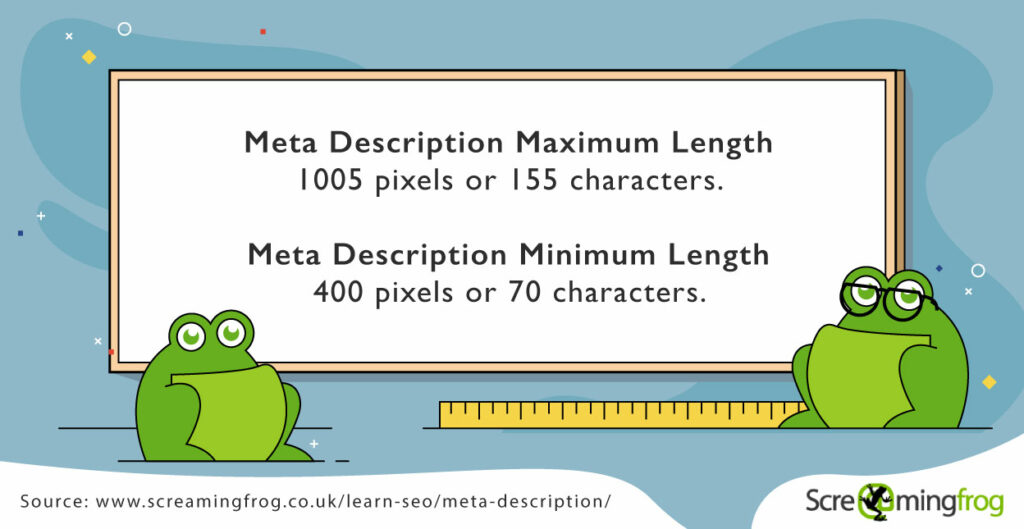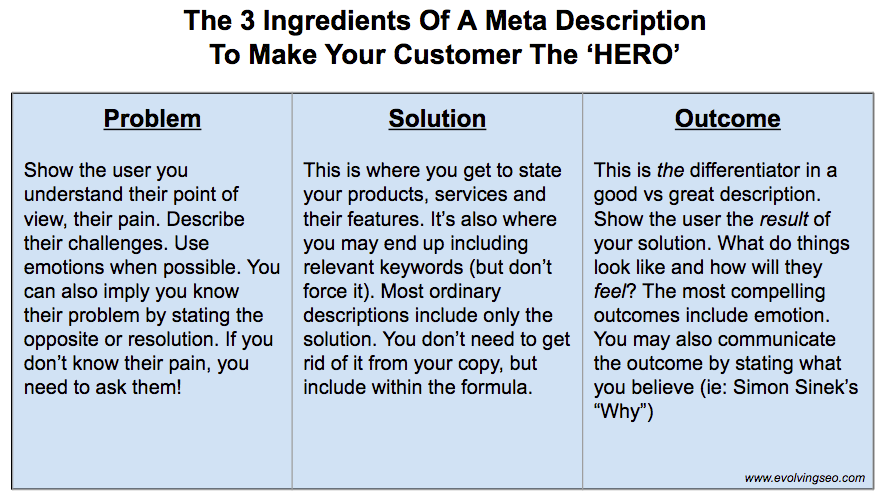
As a business owner, you want to ensure your website stands out in the online marketplace. You want people to know who you are and what you offer, and that’s why meta descriptions are so important.
A meta description summarizes your page’s content that appears under the page title in search engine results. That said, it can be challenging to write a compelling meta description. That’s why we’re here to help: With our meta description checker guide, you can easily find the length and body of your meta descriptions to determine if they need any revisions or adjustments.

Read on and learn more about how a meta description checker tool can help refine and optimize your site for maximum visibility and search engine optimization.
What is a Meta Description Length Checker?
Meta description length checker is a free tool that allows you to check the length of your meta descriptions. This tool can help you optimize meta descriptions for your website to enhance its visibility for search engines.

The meta title and description length checker allows you to quickly identify meta descriptions that are too long or too short. It can also provide insights into how your meta descriptions compare to your competitors. This can help you understand what works and doesn’t when optimizing search engine rankings.
How to Use a Meta Description Checker
The meta description checker tool is important for SEO specialists and marketers alike. It helps determine how well your site is performing in search engine results, and it can make a massive difference in the click-through rate you get from each page on your site. If you’re not sure what your meta description should contain, there are online services that can help. These tools analyze your existing meta descriptions and then provide suggestions for improving them.
Meta title and description checkers work by analyzing the text on any given page to determine if it has the potential to be improved by adding more keywords or phrases. Suppose a few sentences of text are removed from the current meta description. In that case, a new one will be generated with those words removed or replaced with others that might be more effective at attracting clicks from search engines.
Some of these tools also let you customize their recommendations by entering different keyword combinations into their search boxes. So if you’re trying to target a particular niche audience using your website’s meta descriptions, this can also be useful!
Are your meta descriptions short or long?
If you need clarification on whether your meta descriptions are too long or short, you can use the meta description checker tool to help you out. Enter your URL into the tool, and it will show you the length of your meta descriptions and whether or not they are too long or too short.

You can also use a search engine to check the length of your meta descriptions. Type your URL into Google and click on the “cached” link at the bottom of the page. It will show you how long each meta description is.
What should I do if my meta descriptions need to be shorter?
If your meta descriptions need to be shorter, you can use a meta description checker to find out how much text is too much. Generally, anything over 160 characters will be cut off by Google, so aim for shorter descriptions. If your descriptions are too short, however, you may need to provide more information to searchers. In this case, add more relevant information to your descriptions to help them better understand what your page is about.
Features of a Meta Description Checker
The meta description checker tool from SEOBook is a free online tool that enables you to analyze your meta descriptions for length and body. The tool also estimates how many characters your descriptions should be based on the average length of meta descriptions on SERPs. In addition, the meta description checker allows you to compare your descriptions against your competitors, so you can see how you stack up.
Other features of the meta description checker include
• Checking your meta description length against the recommended length
• Checking for duplicates in your meta descriptions
• Reporting on any missing or invalid meta descriptions
• Generating a variance report that shows which meta descriptions are most effective
• Suggestions for improving meta description readability and formatting.
Effective Meta Descriptions
A meta description is a summary of a web page that appears below the page title in search engine results. An effective and optimized meta description should be about 155-160 words.
Google states that a meta description should be short and include relevant information about the page’s content.

A meta description is an HTML attribute that provides a brief web page summary. The most popular search engine, Google, uses meta descriptions to attract user attention to the search results and enhance the click-through rates. Meta descriptions are not a ranking factor in Google’s algorithm, but they can influence click-through rate, which is an essential metric for SEO.
A well-written meta description can help persuade a searcher to click on your result, even if it’s not the top result. If your meta description needs to be better written or included, on the other hand, you could be missing out on valuable clicks.
Here are two tips for creating an effective meta description:
- Write persuasive copy: Your meta description should convince the searcher to click on your result. Use strong calls to action and compelling language.
- Include keywords: Be sure to include relevant keywords for your page so that searchers know what they’ll find when they click through.
Essentials of an SEO-Friendly Meta Description
Meta descriptions are vital to search engine optimization (SEO). A meta description is an invisible snippet of text that appears at the top of your website’s search results page. It gives readers a sense of your website content and its usefulness so they can decide whether to click on it.
You must write an SEO-friendly meta description because
- It helps Google understand the purpose of your page.
- It helps users know what they’re getting into before they visit your page.
- People are likelier to click on links in the descriptions, so having good ones will increase traffic.
Wrapping Up
Meta description checkers can be extremely helpful in optimizing search engine performance. By determining the length of your meta description and body, you can ensure that these elements deliver maximum impact to help boost organic rankings and visitor engagement.
With a few clicks, you can quickly optimize descriptions while also keeping an eye on their performance so you know when changes need to be made. Utilizing a meta description checker effectively achieves higher ranking results and drives more traffic toward your website or blog.

FAQs
You can optimize your meta description by adding a keyword phrase or two along with your website URL.
For example, if you have a website about “dogs,” you might want to include the keyword “dog” in your meta description so that Google will know what type of content is on your site and how relevant it is to their search results.
The ideal number of words that should be used for an effective and optimized meta description is about 155-160 words.
Long meta descriptions are not considered to be SEO friendly; therefore it is advisable to use short and precise meta descriptions for your website.
Latest Blogs
Learn how to rank on AI search engines like ChatGPT, Perplexity, and Gemini by optimizing your content for authority, structure, and relevance. Stay ahead in AI-driven search with this strategic guide.
Explore the best healthcare SEO services for your medical practice. Improve online visibility and effectively reach more patients in need of your services.
Discover top social media agencies specializing in banking solutions, enhancing financial services and driving engagement.
Get your hands on the latest news!
Similar Posts

SEO
5 mins read
Top 10 Agencies for Banking and Financial SEO Services Industry

SEO
4 mins read
Top 10 B2B Enterprise SEO Agency Options for Effective Digital Marketing

Artificial Intelligence
5 mins read